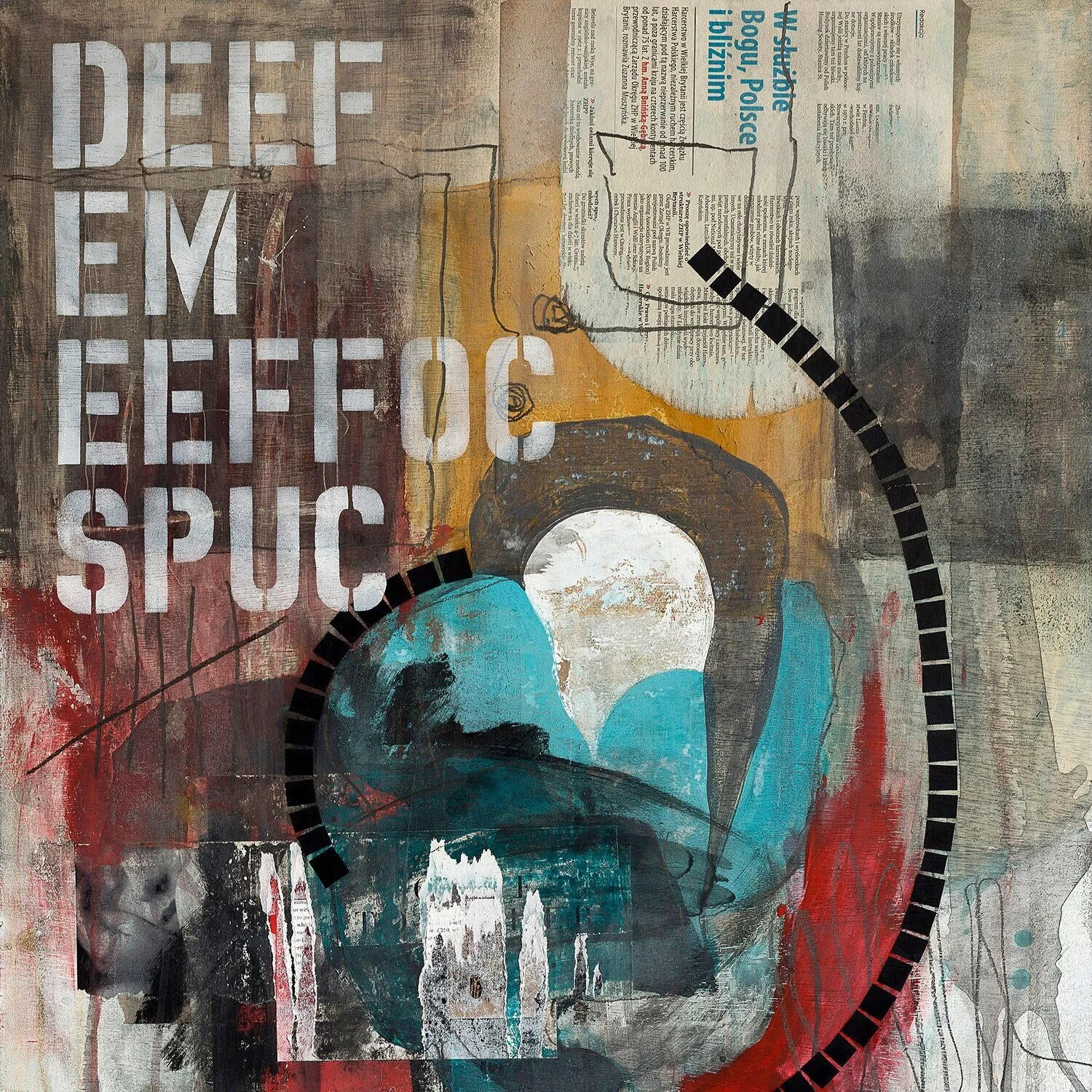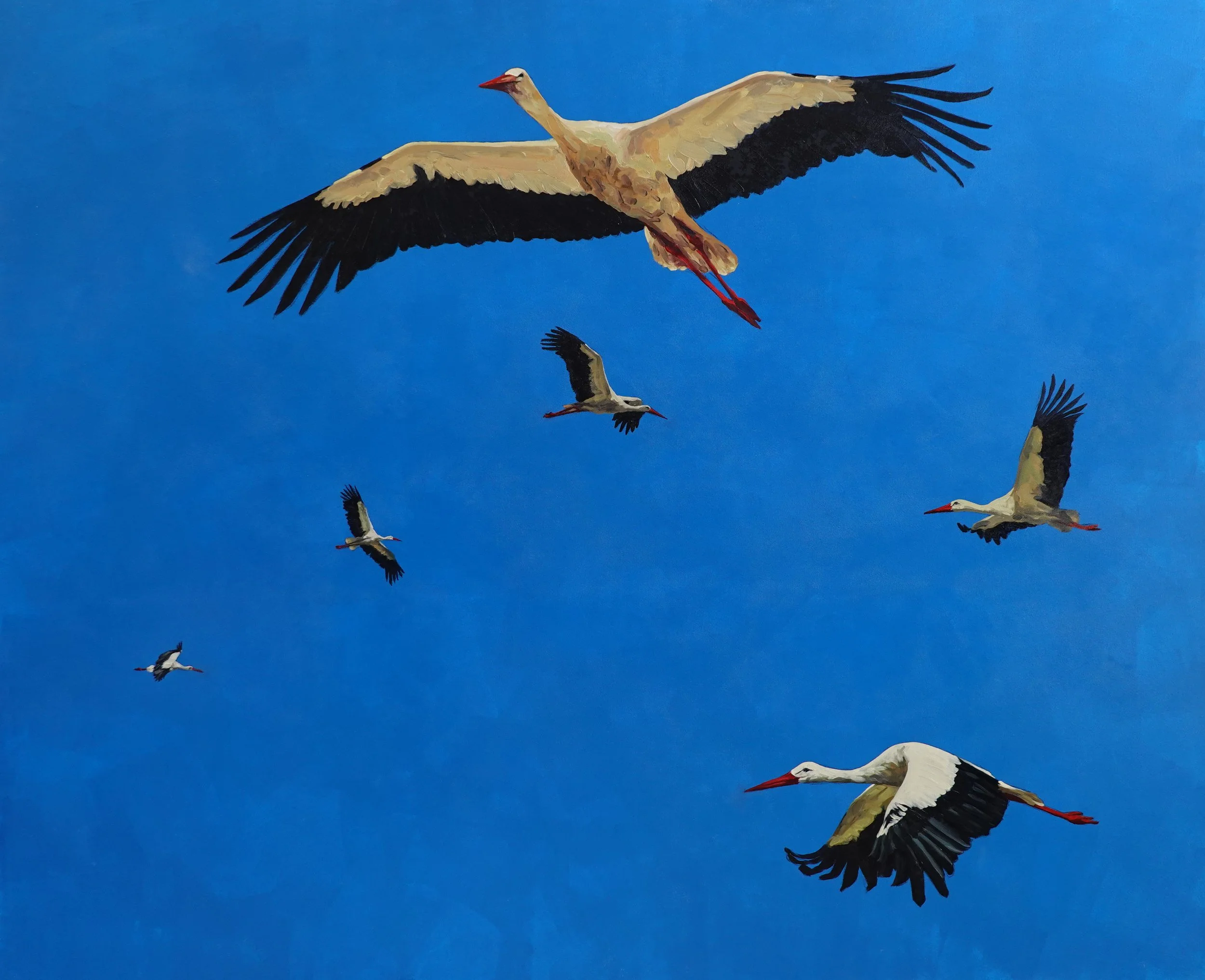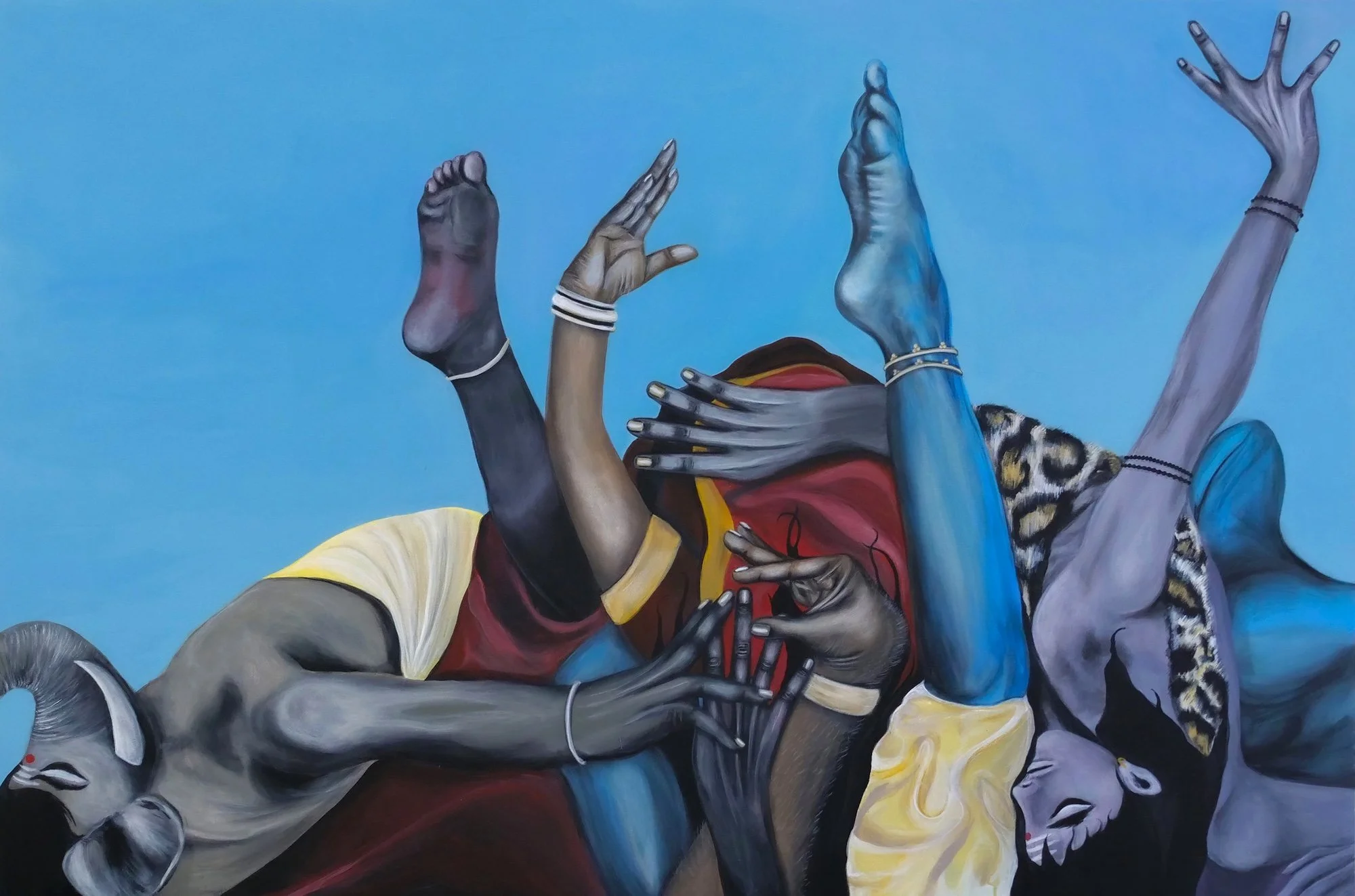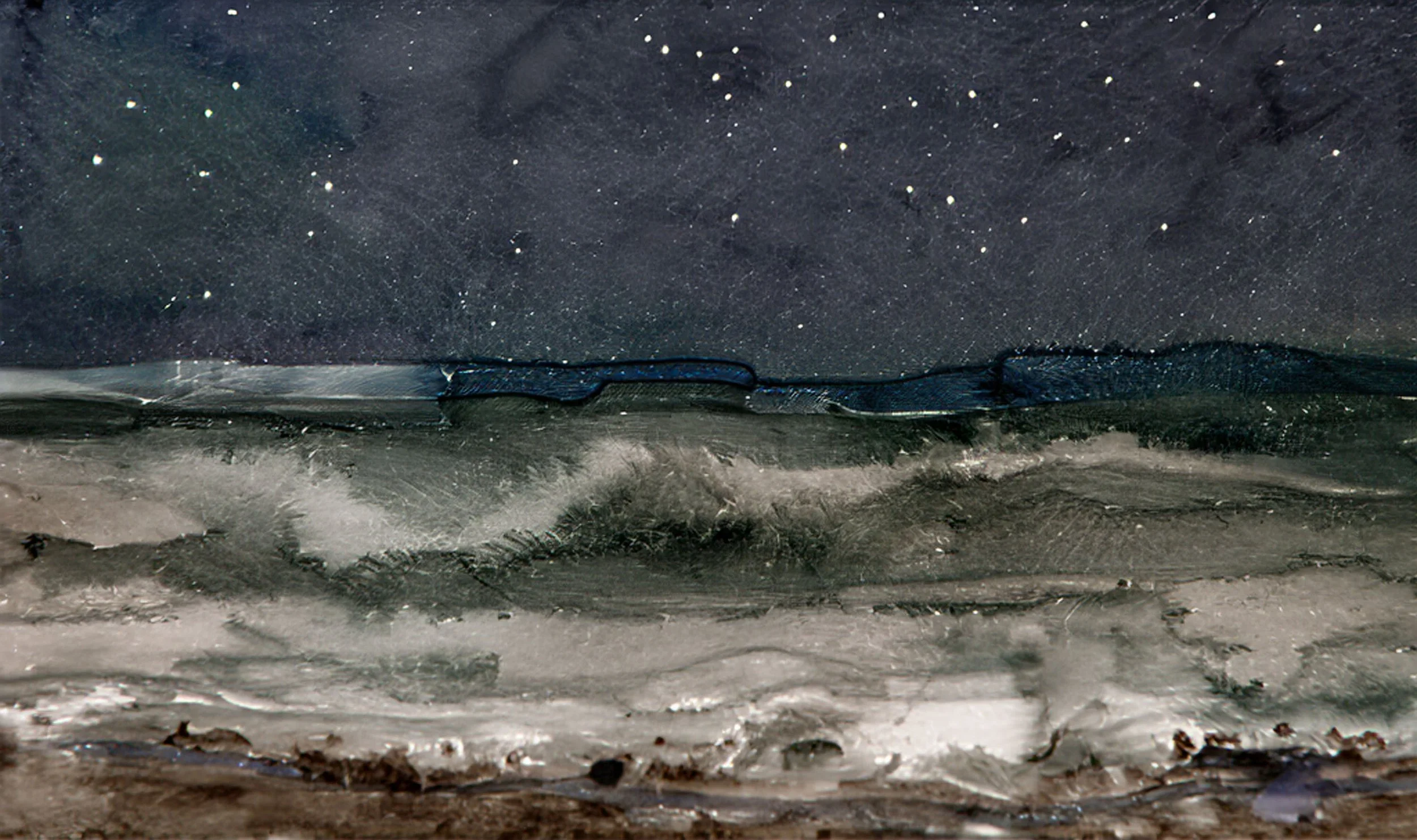11 Questions with Salvatore Esposito
Salvatore Esposito is an Italian artist based in London, UK. Born and raised in Naples, south Italy, he lived with this concept of discarded and recycled material. The fact of knowing what is art and what is considered just discarded material has always been of interest. That is why Salvatore tends to use upcycled material in almost all his works, trying to picture an abstract urban view without human- being direct presence; though what remains is still the sign of his/her interventions.
The proposed collection of artworks are all mirroring back aspects of today's urban life. Despite being abstract, these works have all been completed, using urban architectural texture as inspiration. Landscapes created as collages, using the very same elements that are utilized in everyday life context.
In some works, you may note the use of torn off paper pieces, utilized as a reminder of torn-off posters on city walls, all covering one another, each trying to steal the others' position and attract more attention—a kind of street art dragging into an internal space.
Past Present Future, 180x100cm Salvatore Esposito©
Before talking about your art, could you tell us about yourself? Who is Salvatore Esposito?
I'm an Italian artist based in London, UK. I was born and raised in Naples's countryside in southern Italy, where living as an artist frankly is not that easy. It's maybe one of the most polluted and abused areas in Europe where political corruption and mafia can easily disappoint, discourage, and dishearten you. Still, despite all this, the very same social and cultural context turns into a rare treasure, a perfect field to find interesting subjects and original material.
I strongly believe that this is precisely where my trajectory in abstract art has started. This is where I've been provided with my most significant question in life: what is an art, and what is merely discarded material?
There's a strong bond between me and my hometown, but this has never stopped me from moving on. It's a connection that I carry with me along my path because, in the end, I always considered myself the citizen of the world. I don't believe in geographical borders and boundaries. I have passed my last ten years of life in movement, still, have my baggage ready. So, though it seems that after moving from one city to the other, I've ended up here in London, my most permeant stop, I still think this is just another point for a new departure.
What kind of education or training helped you develop your skillset?
I started by studying graphic design, but gradually, I fell in love with photography. That's how I started experiencing analog photography and living the magic of the darkroom. The whole chemical process was like a spiritual journey to me. The fact of recreating something as human as a point of view, a narrative, through a series of scientific, chemical paces still is fascinating to me. Today, I use pieces (sometimes torn off pieces) of photography as one of the basic materials in my artworks.
Then I started to work as an architectural photographer and later on as a director of photography. I believe all these transitional experiences had and still have a crucial effect on the entire work process.
While in the case of painting, I started quite late in 2004 with merely two bottles of 1-liter gouache color, one yellow and one red (product destined to children use). At some point, I needed black, and I used VHS videotapes instead. I wasn't thinking. It was all emotional and instinctive. Later on, I started to use objects found during my long walks in the city; most of these objects were left as trash outside of the houses; they were unwanted items. The insane part of the work was after finishing and completing the work. I used to place the painting out beside the trash bin again and used to watch curiously to see if I can spot anyone who can note that very painting as a piece of art. Regardless of the location, it's been exposed in; that meant practically exhibiting in the streets and not in the gallery. So again, I think the city was my real school.
Non Vedo Oltre, 64x84cm Salvatore Esposito©
Please describe the intention behind your art. How do you successfully express this intention?
I work quite instinctively. Normally the collections are created respecting a certain form or a concept that is in common. When I finish the whole process and distance from the works, I start noting the theme behind the project. But I usually start with no specific intention in mind. It's merely a necessity that I feel to create something different.
To me, paintings are like memories. Some are very remote ones. The fact is, I believe abstract art goes beyond physical and direct visual messages. Its main conceptual intention might be to create a feeling, a sensation that most possibly transmits most directly to the viewer. Maybe that's why most of my works are entitled "Untitled" because I believe anyone can see whatever he/she wants in abstract art. Giving a title, you force the viewer to search for a certain concept. The viewer should be able to spot the concept and gain an emotion without any command from the artist.
Do you have a role model that you've drawn inspiration from when creating your art?
Undoubtedly the works of Alberto Burri and Kurt Schwitters have the most effect on my work. I've learned and inspired by every work of these masters. Schwitters was the first artist who shocked me with his artworks. There were objects of everyday life included in his painting. That is the same thing that I try to do in my works. I believe any object that comes into your hands influences your experience of life. While coming across the works of Burri to me was like finding my soul mate. His work, his way of using the material, has surely inspired me more than anything else.
Apart from that, what most influenced me was Dadaism. I'd love to define myself as a post-Dadaist.
Utopia, 60x80cm Salvatore Esposito©
Your artworks are all mirroring back aspects of today's urban life that directly impact the way you construct your artistic production. Could you tell us about your artistic research that leads you to create abstract collages?
I consider my artworks as some detailed shots of a vaster point of view. I want to think that these abstract views reflect my long daily trajectories throughout the city—a kind of abstract documentation of the daily life. I still find objects during walking, I obtain my most basic work elements from the street, both conceptually and materially.
Any typical view of the city, a normal bus stop, can turn into an artistic context during these trajectories. For example, the idea of the painting "Feed Me Coffee Cups" came to me after spotting a deformed litter bin in a coffee shop. Art is relative, in the sense that an object left in the corner of a deserted alley is just an abandoned object, a piece of trash, maybe. The same object placing on the pavement of an art gallery turns into a piece of art.
What do you see as the strengths of your pieces, visually or conceptually?
I want to think that my work is recognizable even without any direct reference to my name. I follow an instinctively formed life-long research, and I hope that is notable in my work. Visually I guess using pieces of paper as layers which reminds city walls covered over and over by pale invasive posters (a kind of street art maybe, dragged into an enclosed space of gallery) or the curved dashed line that I use quite often to make the whole composition look like a path on the map, can identify my work.
Can you tell us about the process of creating your work?
I normally use boards as background, though recently, I tried canvas too. Sometimes this board is an upcycled IKEA desk or a broken door (I once used a dismounted washing machine door as the background); it varies. I'd like to start with layers of paper, united and attached before being applied on the board. Then I move on with colors. I like to interfere with the whole process, using fast, spontaneous strokes of acrylic. It's a constant process of applying layers and covering them once again until finding the final, desirable composition.
Feed me coffee cups, 61x70cm Salvatore Esposito©
How have you been so successful with creating and marketing your art during the pandemic time?
I was just restless; I couldn't stop working. Actually, during the pandemics, I did more than any other time. I guess not being able to go out. I started remembering. It was and still is a very positive sequence of my life. I don't think art can be limited and imprisoned for any reason; it always finds its way out. The high amount of these recent works helped me participate in various events and exhibitions, both physically and virtually.
What was the most challenging part of your projects?
The final phase is always the most decisive part. I could never possibly know when a painting is actually finished. Sometimes I continue working without realizing that the final phase is passed. Unfortunately, you can't do "Ctrl+Z" in paintings.
Untitled 001 (Wind's Unsustainable Lightness Project), 50x50cm Salvatore Esposito©
Untitled 002 (Wind's Unsustainable Lightness Project), 50x50cm Salvatore Esposito©
Any shows, galleries, or publications where our readers can find your work?
At the beginning of October, I participated in a collective conceptual exhibition in South London, curated by Uncovered Collective. At the end of October, I have another exhibition in the City of London, curated by Leyden Gallery. From next January to March, I'll have another exhibition in Manchester. I try to keep updated my website and Instagram page.
What other interests do you have outside of art?
Upcycled design is a very interesting topic to me. Anytime I find an old piece of furniture, I entertain myself renewing it. It's a complete process of metamorphosis and is fascinating. Apart from that, being an Italian, I can't help loving to cook.


























